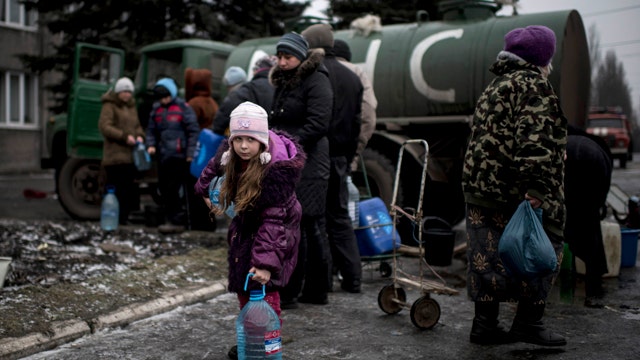Officials: More than 5,300 killed in Ukraine fighting
Analysts: Russia trying to create a land bridge to Crimea
DONETSK, Ukraine – A powerful explosion rocked a chemical plant and set it on fire Monday outside the separatist stronghold of Donetsk in eastern Ukraine, where fierce fighting has surged despite a renewed diplomatic push for peace.
In Washington, President Barack Obama held talks with German Chancellor Angela Merkel about reviving an elusive Ukraine peace plan, a meeting that comes as she and French President Francois Hollande are getting ready to meet Wednesday with their counterparts from Russia and Ukraine.
No casualties or damage were immediately reported from the huge blast at the plant in Donetsk, which the rebels said was hit by government shelling. The city lies in the middle of Ukraine's industrial heartland and explosions like this have long been feared.
The fighting between Russia-backed separatists and Ukraine government forces has killed more than 5,300 people since April and displaced more than a million people in eastern Ukraine.
The rebel Donetsk News Agency said Monday the chemical plant west of the city was hit by a Ukrainian artillery shell but the fire was put out and it posed no danger to residents.
Heavy shelling around Donetsk killed two people, rebel official Eduard Basurin said. In neighboring areas under government control, at least seven people were killed Sunday, the Donetsk regional police chief said.
Ukraine, meanwhile, said about 1,500 Russian troops had crossed the border into Ukraine via rebel-controlled border posts over the weekend but military spokesman Andriy Lysenko did not provide any proof.
Russia has denied supplying the rebels with either troops or heavy weapons, but Western military experts say the sheer amount of new heavy weapons in eastern Ukraine belies the Russian denial.
The leaders of Germany, France, Russia and Ukraine aim to hold a summit Wednesday to breathe new life into a much-violated September peace plan for eastern Ukraine.
Without a resolution, "Russia's isolation will only worsen, both politically and economically," Obama said after his talks Monday with Merkel.
Both the U.S. and Germany have emphasized a need to resolve the conflict through diplomacy, but the escalation of fighting has led the White House to reconsider its opposition to sending lethal aid to Ukraine. Germany, France and some other EU nations oppose the idea of arming Ukraine's beleaguered military, fearing it could spark even wider hostilities.
Martin Schaefer, a spokesman for the German foreign ministry, told reporters in Berlin that discussions in Minsk wouldn't contain any radically new elements.
"It's not about developing new parameters but about doing the obvious, which is achieving an end to the direct fighting," he said.
In Brussels, European Union foreign ministers decided to hold off for now on expanding sanctions against Russia and the separatists so as to await developments from the peace talks. The need for more sanctions will be re-assessed Monday.
In Moscow, Russian radio station Govorit Moskva quoted President Vladimir Putin's spokesman, Dmitry Peskov, as dismissing speculation that Merkel had handed the Russian leader an ultimatum at their talks Friday in Moscow.
"Nobody has ever talked with the president with ultimatums, and they could not even if they wanted to," Peskov was quoted Monday as saying.
__
Nataliya Vasilyeva and Vladimir Isachenkov in Moscow, Frank Jordans in Berlin and Lorne Cook and Raf Casert in Brussels contributed to this report.

